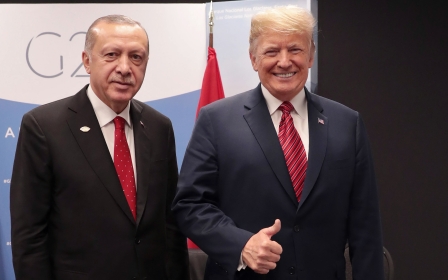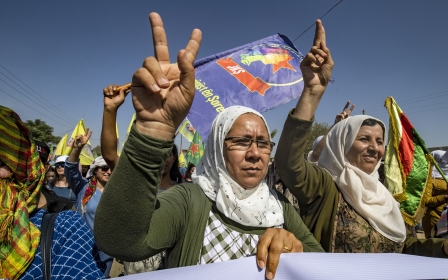Will European countries bring their Islamic State fighters and families home?

When US President Donald Trump opened the way for Turkey to begin its offensive in northeastern Syria, he made a point to emphasise that Ankara would be responsible for all Islamic State groups (IS) members in Kurdish custody.
The US president also issued a warning to European countries, in particular France and Germany, calling on them to take back IS fighters and their families who had come from Europe.
Since then, Turkish President Recep Tayyip Erdogan has doubled down on Trump's statement, and said on Thursday that he would deport IS suspects to their countries of origin if they are accepted.
While countries like Kazakhstan and Kosovo have taken back IS fighters, many Western European nations have avoided the issue altogether.
Some are taking steps to stop IS suspects from coming back to Europe, from stripping citizenship to introducing restrictions on repatriations.
New MEE newsletter: Jerusalem Dispatch
Sign up to get the latest insights and analysis on Israel-Palestine, alongside Turkey Unpacked and other MEE newsletters
Here's a breakdown of the processes in place in the five Western European countries with the highest number of IS suspects:
United Kingdom
The United Kingdom has refused to bring back any IS militants or their family members from the Kurdish-run camps in Syria.
Some of the steps the UK has taken to stop IS members from coming back include stripping the citizenship from any British citizen eligible for nationality in another country.
High-profile cases that bought this to light include Shamima Begum, who is of Bangladeshi origin, and British-Canadian dual national Jack Letts.
Britain, however, has said that other British citizens who have fled IS territory can come back to the UK via a "third country" like Turkey.
Meanwhile, the UK has said that children of British members of IS will not be brought back to Britain from Syria as it would be too dangerous for diplomats to retrieve them.
France
France contributed the largest number of IS fighters in Iraq and Syria, according to figures given by the International Centre for the Study of Radicalisation.
Earlier this year, the French government said it was preparing to repatriate IS militants from Iraq and Syria.
Former French president Francois Hollande toyed with the idea of stripping citizenship from foreign fighters. He scrapped the plan after he was unable to get enough support in parliament.
Paris has faced heavy criticism from rights groups for supporting calls for foreign fighters to be tried in local Iraqi courts for their crimes.
Since then, France has said it would bring back the children of French IS members on a case by case basis in partnership with the Red Cross.
Earlier this year, Interior Minister Christophe Castaner said suspected IS militants that return to France will be tried, and face "automatic jail time".
Germany
In response to Trump's previous call for Germany to take back German IS militants, Berlin said it would do so if it has consular access.
Given the instability in Syria, it seems doubtful that German IS members will gain consular access, meaning many will not be returned.
Germany has also said it will strip the citizenship of German IS fighters who have dual citizenship or are eligible for it.
Unlike Britain and France, Berlin has vowed to bring back children belonging to IS members and said it would make the child's next of kin their legal custodians.
Belgium
In 2016, Belgium was described by the International Centre for Counter-Terrorism as having the highest number of foreign fighters per capita within the Islamic State group's ranks.
Belgian authorities have said they will repatriate children of different age brackets, but not their mothers.
Children under the age of 10 will be immediately repatriated, while those between the ages of 11 to 18 will be returned on a case by case basis.
Belgian authorities have not specified whether the repatriated children would be taken into foster care or given to their relatives.
Sweden
Sweden's policy on its citizens who joined the Islamic State group wanting to return home remains unclear.
Local Swedish media outlets have said that none of the 150 citizens who have returned home from IS territory have been prosecuted since coming back.
Stockholm currently lacks the relevant legislation needed to prosecute returnees. Some Swedish politicians have debated stripping citizenship from IS members.
It has, however, said that anyone who joined IS will not receive any consular assistance.
Middle East Eye delivers independent and unrivalled coverage and analysis of the Middle East, North Africa and beyond. To learn more about republishing this content and the associated fees, please fill out this form. More about MEE can be found here.




